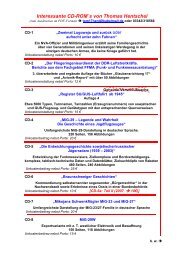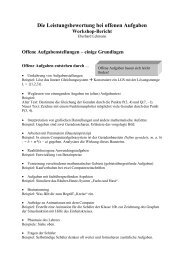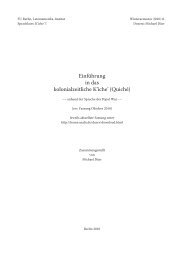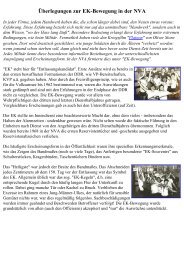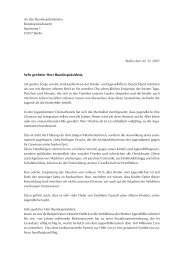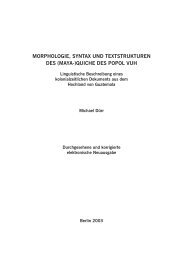SHADOW BOXING: INDONESIAN WRITERS ... - home . snafu . de
SHADOW BOXING: INDONESIAN WRITERS ... - home . snafu . de
SHADOW BOXING: INDONESIAN WRITERS ... - home . snafu . de
Create successful ePaper yourself
Turn your PDF publications into a flip-book with our unique Google optimized e-Paper software.
Shadow Boxing 173<br />
addresses more fully these ambiguities of human nature. This thematic focus is part of<br />
what Sindhunata terms an "aesthetics of ugliness/' a literary strategy inspired by the<br />
nineteenth-century German philosopher Karl Rosenkranz. 60 An aesthetics of ugliness<br />
rests on the hermeneutic notion that if cultural expression intends to <strong>de</strong>pict the<br />
interconnected totality of human existence, then it must show, for example, that<br />
beauty co-exists with ugliness, or that sickness is in a constant dialectic with health,<br />
and vice versa.<br />
The key to un<strong>de</strong>rstanding the sociopolitical significance of the marginal beings in<br />
Anak Bajang lies in grasping the symbolism of their "ugliness." Three human siblings—<br />
Guwarsa, Guwarsi, and Dewi Anjani—are personally confronted by this "ugliness"<br />
when they are transformed into monkeys. 61 These children are distraught at this turn of<br />
events, and when their father, Resi Gotama, discovers them, he is overcome with grief.<br />
However, Resi Gotama soon checks himself and realizes the positive aspect of his<br />
children's transformation. Their suffering, he claims, will become a crucial factor in<br />
fighting the evil Rahwana:<br />
"Guwarsa, Guwarsi, and Anjani, my children. Don't be sad. For the world<br />
now greatly yearns for your suffering at the moment. You have become monkeys,<br />
abject creatures. But precisely by being monkeys you will be aware of your true<br />
natures as titah [creatures], who are nothing in the face of their Creator."<br />
"Over there across the sea, wickedness and pri<strong>de</strong> are enthroned in an earthly<br />
creature, who <strong>de</strong>sires to reach above his station as a titah ... His wickedness and<br />
pri<strong>de</strong> can only be quelled by those who are aware of themselves as titah, as<br />
small, and as insignificant. This pri<strong>de</strong> can only be quelled by humility, my<br />
children. Be happy you three, because it is precisely by being in the form of<br />
monkeys that you will easily be aware of yourselves as titah." 62<br />
Although both Rahwana and the monkeys are <strong>de</strong>scribed as titah (an Old Javanese<br />
word taken up by Javanese Catholicism to mean one of God's creatures or creations),<br />
there is a vast difference in outlook between them. Unlike Rahwana, who thinks he is<br />
some kind of god, the monkeys are very much aware that they are not "complete" as<br />
human beings: "monkeys are titah longing for the completeness of human beings." 63 By<br />
60 Ibid., p. 217.<br />
61 Guwarsa and Guwarsi become monkeys after they dive into a lake in search of the Cupu Manik<br />
Astagina, a magical pillbox containing visions of the past and the future. The box was their sister Dewi<br />
Anjani's keepsake, a gift from her mother, Dewi Windradi, which was in turn a gift from her lover, the sungod<br />
Batara Surya. After Dewi Windradi's husband, Resi Gotama, discovered his wife's infi<strong>de</strong>lity, he threw<br />
the pillbox into a lake. Soon after Guwarsa and Guwarsi attempted to retrieve the box, Dewi Anjani<br />
herself dives into the lake, and also resurfaces covered in monkey fur.<br />
62 "Guwarsa, Guwarsi, dan Anjani, anakku. Janganlah kau bersedih. Sebab pen<strong>de</strong>ritaanmu saat ini sangat<br />
diinginkan dunia. Kau telah menjadi kera, makhluk yang hina. Tapi justru sebagai kera itulah kau akan<br />
menyadari hakekat dirimu sebagai titah, yang tiada artinya apa-apa di hadapan Penciptanya."<br />
"Di seberang sana, telah bertahta kejahatan dan kesombongan dalam diri seorang makhluk dunia, yang<br />
ingin melebihkan dirinya sebagai seorang titah. Kesombongannya dan kejahatannya tidak dapat<br />
ditaklukkan oleh siapa pun juga, kecuali oleh mereka yang menyadari diri sebagai titah, yang kecil, dan tak<br />
berarti apa-apa. Kesombongan itu hanya bisa ditaklukkan <strong>de</strong>ngan kerendahan hati, Anakku.<br />
Berbahagialah kamu bertiga, karena kamu akan <strong>de</strong>ngan mudah menyadari dirimu sebagai titah, justru dalam<br />
rupa kera." Sindhunata, Anak Bajang Menggiring Angin, pp. 42-43.<br />
63 "kera adalah titah yang merindukan kesempurnaan manusia." Ibid., p. 43.



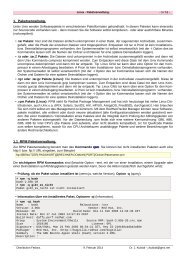
![Parameterdarstellungen [ x(t), y(t) ] Eberhard ... - home . snafu . de](https://img.yumpu.com/22517728/1/184x260/parameterdarstellungen-xt-yt-eberhard-home-snafu-de.jpg?quality=85)
